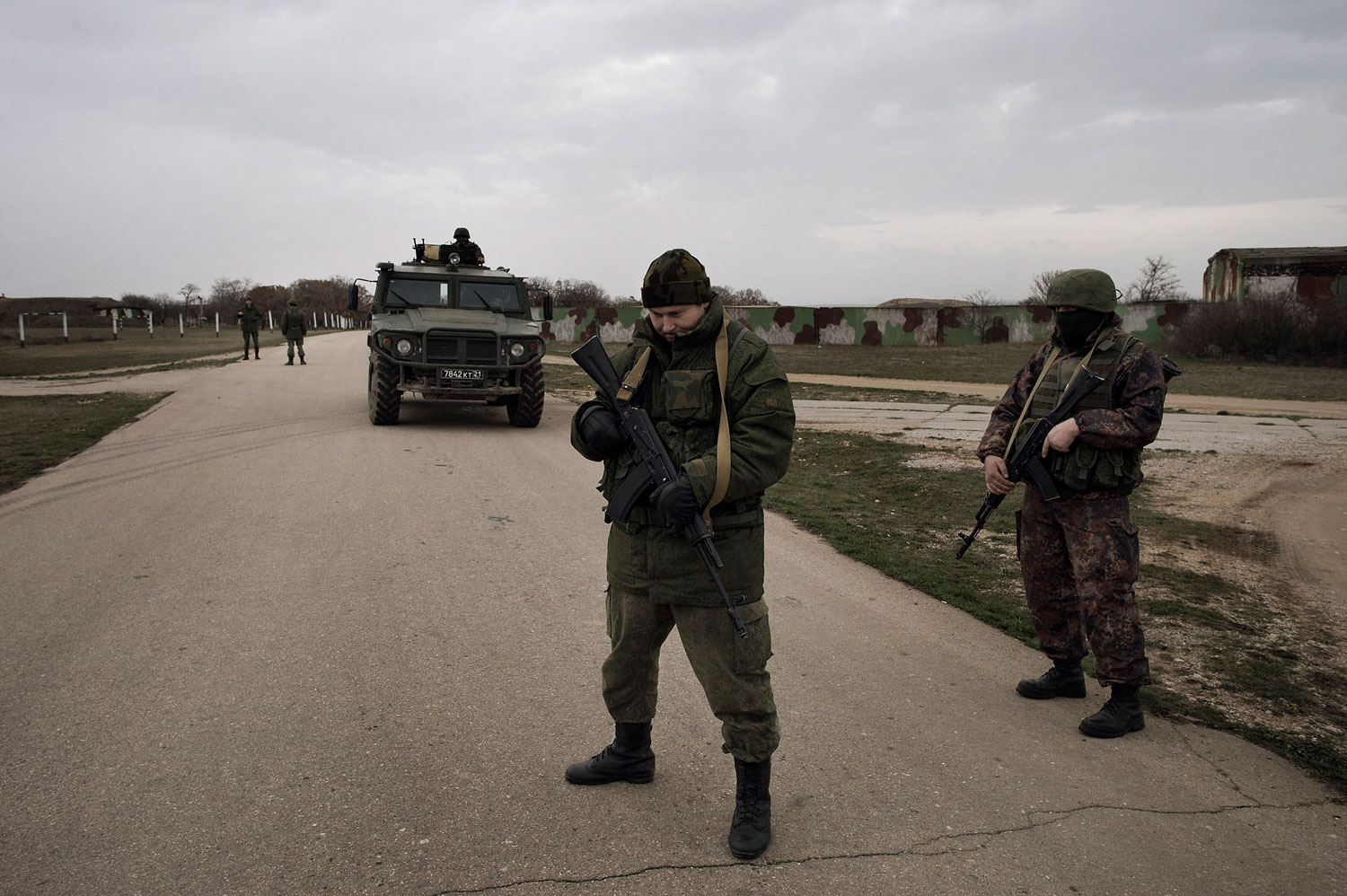
Russia’s power play in Crimea has left the European Union in a quandary. Officials in Brussels are scrambling to respond to the acts of aggression from its largest neighbor and third biggest trading partner. European leaders across the region have voiced concern over Russia’s Ukraine strategy, but when it comes to what the repercussions will be for its maneuvers, the message has been far from consistent. Much-mooted sanctions, which E.U. rules require unanimous agreement before imposing them, look unlikely with the bloc’s leading economy, Germany, wary of such measures.
Speaking ahead of an emergency meeting of E.U. foreign ministers on March 3, German Foreign Minister Frank-Walter Steinmeier cautioned Europe against responding to Moscow’s provocations with provocations of its own. “Diplomacy is not a sign of weakness but is more needed than ever to prevent us from being drawn into the abyss of a military escalation,” said Steinmeier. But even conflict-averse Germany shows signs of reaching the end of its tether: German paper Bild reported on Monday that German Chancellor Angela Merkel reportedly questioned if Putin “was still in touch with reality” on a call with President Obama.
So far the E.U.’s most overt response to Russia’s actions in Crimea has been a communiqué on Monday in which it demanded the “immediate withdrawal” of Russian forces to their bases. “In the absence of de-escalating steps by Russia,” the E.U. Council suggested it would discuss the possibility of suspending bilateral talks on visa matters and “further targeted measures.” It did not expand of what these further targeted measures may be, but in effect set a deadline for Russia to change its strategy ahead of a meeting in Brussels on Wednesday. On Tuesday Putin appeared to downplay tensions by saying there would be no war with Ukraine, but did not rule out any options for military intervention in the future.
The 28-member bloc has worked on building close ties with Russia over two decades. Russia is the E.U.’s third largest trading partner, while the bloc is Russia’s first largest trading partner. Germany, the E.U.’s leading economy, is the biggest importer of Russian gas and is Russia’s third-largest trade partner on its own.
Given the complexity of European ties with Russia, its response to the crisis has been more muted than the more confrontational statements of U.S. President Barack Obama and Secretary of State John Kerry. “The Americans are far away,” noted a top Germany diplomat, speaking anonymously to Reuters, “They have a lot less to lose from an escalation of this crisis.” The U.K. too has been careful to consider its own interests with Russia, despite its Foreign Minister William Hague warning Russia “there will be consequences” for its actions in Ukraine. The government faced criticism when on Monday an official document on possible responses to Russia was photographed; it reportedly included a suggestion that London would not close its financial doors to Russians given the scale of Russian assets and investment already tied up in Britain’s capital.
To further complicate the situation, the E.U., many of whose member states rely heavily on Russian oil and gas, is due to discuss the future of the continent’s energy policy later this month. With limited options on the table to immediately diversify Europe’s energy sources, the E.U. will likely continue to need access to cheap Russian fossil fuels. Yet there are some countries that have been willing to stand up to Russia despite their reliance on its energy, says Jana Kobzova, a Russia and Eastern Europe expert at the think tank European Council on Foreign Relations. “From Poland to Slovakia to the Baltic states, these are countries who are heavily dependent on Russia and who might be hurt if Russia cuts the gas supplies to the Ukraine, but they are still calling for a tough response,” says Kobzova. The idea of targeted sanctions and asset freezes of those close to Putin is also another strong option the E.U. could use to deter Russia, says Kobzova.
As the crisis continues, what is becoming increasingly obvious is that all sides have much to lose in the standoff. While individual E.U. member countries may have built up significant economic ties with Russia, Moscow is also gambling with ties to one of its most important markets. An estimated 75% of foreign direct investment stocks in Russia are from E.U. member states. If the E.U. chooses to leverage its influence there, it could be a gamble that works to its favor. As Dutch Foreign Minister Frans Timmermans suggested on Monday, “The consequences [of an escalation] will be bad for everyone, but for Russia they will be far worse than for the E.U.”
More Must-Reads from TIME
- Cybersecurity Experts Are Sounding the Alarm on DOGE
- Meet the 2025 Women of the Year
- The Harsh Truth About Disability Inclusion
- Why Do More Young Adults Have Cancer?
- Colman Domingo Leads With Radical Love
- How to Get Better at Doing Things Alone
- Michelle Zauner Stares Down the Darkness
Contact us at letters@time.com